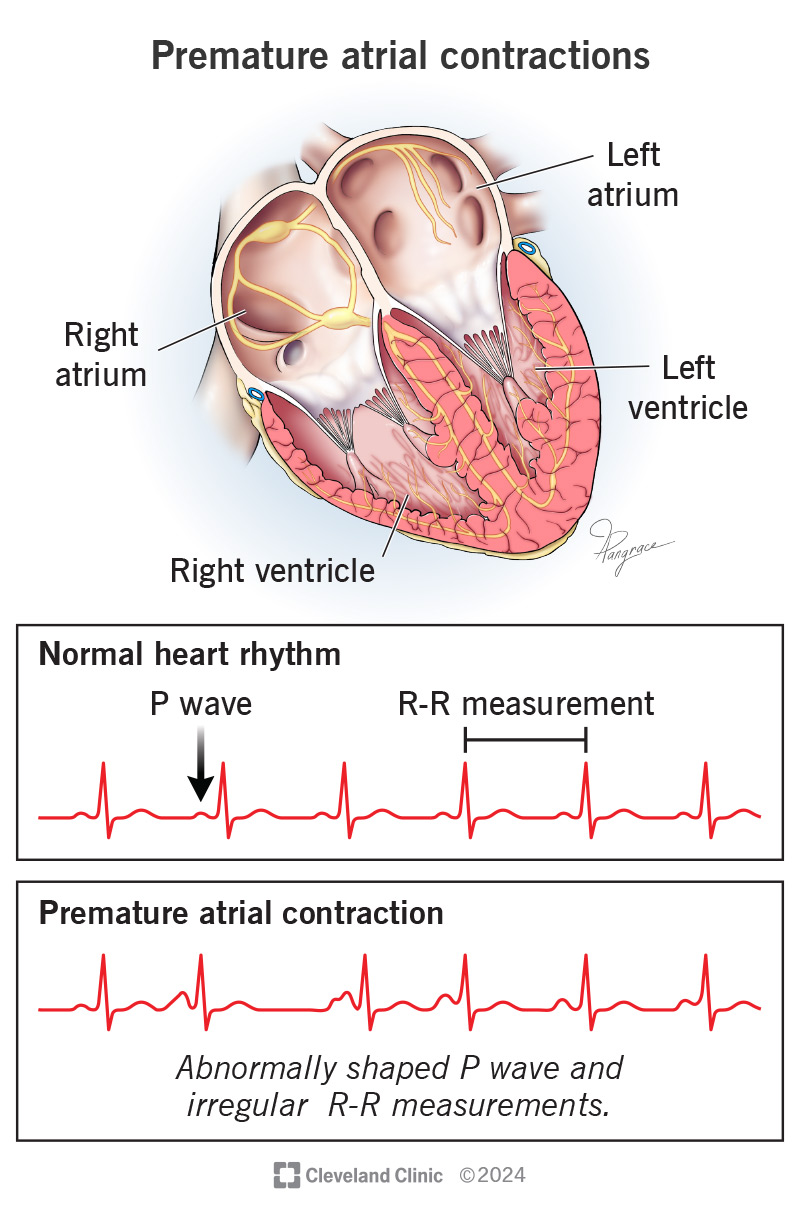A premature atrial contraction is an extra heartbeat that starts in one of your heart’s upper chambers (atria). It may feel like your heart skips a beat. Premature atrial contractions usually don’t need treatment. But you should contact a healthcare provider if your premature atrial contractions start happening more often.
Advertisement
Cleveland Clinic is a non-profit academic medical center. Advertising on our site helps support our mission. We do not endorse non-Cleveland Clinic products or services. Policy

Image content: This image is available to view online.
View image online (https://my.clevelandclinic.org/-/scassets/images/org/health/articles/premature-atrial-contractions)
Premature atrial contractions (PACs) are extra heartbeats that start in the upper chambers (or atria) of your heart.
Advertisement
Cleveland Clinic is a non-profit academic medical center. Advertising on our site helps support our mission. We do not endorse non-Cleveland Clinic products or services. Policy
Normally, your heart contracts in an organized manner. Electrical impulses (which tell your heart cells to contract) start in the right upper corner of the right atrium in a region called the sinus node. The sinus node fires electrical impulses in an organized and rhythmic manner, determining your heart rate. PACs occur when your upper chambers contract prematurely from an area different from the sinus node and briefly interrupt your heart’s normal rhythm.
When the premature, or early, signal tells your heart to contract, there may not be much blood in your heart at that moment. That means there’s not much blood to pump out. A pause and a strong beat may follow the extra heartbeat, making it feel like a skipped beat.
A premature atrial contraction can feel like an extra beat when there’s more blood in the heart to pump than there is with a skipped beat.
Premature atrial contractions, also called beats or complexes, are common in people of all ages. A premature atrial contraction can make you feel unsettled. But you usually don’t need to be concerned unless you have a lot of them.
Premature atrial contraction symptoms may include heartbeats that:
Advertisement
You may also have anxiety or shortness of breath. But you may not have any symptoms at all.
Premature atrial contraction causes may include:
If PACs happen to you often, your healthcare provider will look for a cause. Often, the cause is unknown.
Anyone can get premature atrial contractions, but they’re more likely to happen frequently in people who:
Frequent premature atrial contractions can lead to atrial fibrillation (Afib).
Researchers define “frequent” PACs by different numbers. They can range from 76 to more than 500 premature atrial contractions in 24 hours, for example.
Usually, your blood pressure is normal with premature atrial contractions. It’s possible for a healthcare provider to miss premature atrial contractions during a physical exam. This is because they may not happen during the exam.
If you’re having premature atrial contractions, your provider may want to order:
Most of the time, you don’t need treatment for PACs. They usually go away on their own. But if your symptoms are bad or happen regularly, your healthcare provider can treat the cause.
Your provider may treat your premature atrial contractions with:
Advertisement
Beta-blockers can make you feel tired, dizzy or nauseated. Talk to your provider if your side effects don’t get better.
Different antiarrhythmic medications (like flecainide, procainamide and amiodarone, among others) can have several side effects and interact with other medications.
Catheter ablation carries risks like blood clots, bleeding or infection. But providers generally consider it a low-risk procedure. Complications rarely happen after the procedure. You can most likely return to work in a week.
In most cases, you don’t need treatment and your outlook is good. But if you’re having premature atrial contractions often, you may be at risk of getting atrial flutter and atrial fibrillation (Afib).
Your outlook depends on what’s causing your premature atrial contractions. Your provider will look at the conditions you already have when considering your prognosis. For example, your situation is more serious if you have problems with your heart’s structure.
You may be able to lower your risk of premature atrial contractions by:
Advertisement
You may be able to have fewer premature atrial contractions if you:
Usually, premature atrial contractions may go away by themselves and may recur during periods of stress or physical illness. Pay attention to whether you start having more PACs. You should make an appointment with a healthcare provider if your symptoms continue, get worse or happen with other symptoms.
You may want to consider asking your provider:
No. Atrial fibrillation is a more serious heart rhythm issue with an irregular heartbeat.
No. Premature atrial contractions in pregnancy are common. They normally stop by themselves and don’t need treatment.
They start in different parts of your heart. Premature atrial contractions start in your atria (upper chambers). Premature ventricular contractions start in your ventricles (lower chambers).
Premature atrial contractions (PACs) may take you by surprise and make you feel uneasy. But they’re usually not a cause for concern. Check in with a healthcare provider if the number of PACs you have increases. Because premature atrial contractions can predict more dangerous heart conditions, be sure to go to all of your regular check-ups with your provider.
Advertisement

Sign up for our Health Essentials emails for expert guidance on nutrition, fitness, sleep, skin care and more.
Learn more about the Health Library and our editorial process.
Cleveland Clinic’s health articles are based on evidence-backed information and review by medical professionals to ensure accuracy, reliability and up-to-date clinical standards.
Cleveland Clinic’s health articles are based on evidence-backed information and review by medical professionals to ensure accuracy, reliability and up-to-date clinical standards.
When your heart needs some help, the cardiology experts at Cleveland Clinic are here for you. We diagnose and treat the full spectrum of cardiovascular diseases.
